| Article Overview:
Liberia West Africa was on the fast track to be our first colony.
President Monroe helped create the American Colonization Society to
send freed slaves back to Africa if they so wished. Today,
Liberia is battling the Beast of Terror. Should we go help our
former citizens? Or, should we turn our heads and pretend
Africa doesn't count? |
 VigilanceVoice VigilanceVoice
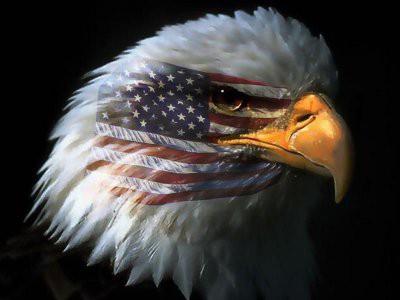
www.VigilanceVoice.com
Friday--June
27, 2003—Ground Zero Plus 653
___________________________________________________________
Liberia, West Africa--America's
First Colony? Do We Support It As We Did Iraq & Afghanistan?
___________________________________________________________
by
Cliff McKenzie
Editor, New York City Combat Correspondent News
|
GROUND ZER0, New York, N.Y.--June 27, 2003--
When I was in Vietnam fighting and writing with the United States
Marine Corps, I learned about the toils and troubles of a country
called Liberia, West Africa.
My buddy, Julius Maxwell Belcher, was a dual
citizen of Liberia and the United States. He was a striking man,
about as tall as I, 6-feet, 4 inches, with golden skin and mellifluous
Voice that boomed with authority and education. Max was
a Rhodes Scholar Candidate, but elected to join the Marine Corps for
the same bizarre reason most of us who had dropped out of college did
in 1964--to test our manhood. To evolve into real men. To
become real, professionally trained killers.
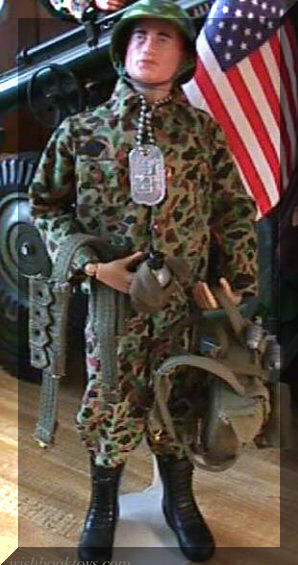 |
|
Ready to
achieve manhood in the Marine Corps |
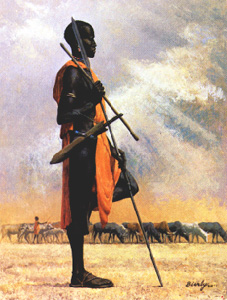 |
|
Ready to
achieve manhood in Africa |
Back in his country, Max would have been stripped of all possessions
but a loin cloth and a spear, and sent out to single-handedly kill a
lion to achieve manhood. Instead, he enlisted in Marine Corps
and ran through its gauntlet, exiting boot camp as Marine Combat
Correspondent in our radio and television division.
I knew nothing of Africa or its culture until I
met Max. For hours he would spin tales of the land and
turmoil, all fascinating since his father was a diamond smuggler.
Max's father was black and his mother Jewish.
His father worked for Shell Oil and was constantly traveling to Africa
to make deals. In college, his father met a radical African named Kwame
Nkrumah, who became a close friend.
Max told us his father thought Nkrumah was mad, but nevertheless they
became close friends.
Max's father, during trips to Liberia, started to
smuggle out diamonds. The country was rich in minerals,
and stuffing a few in his pockets made his paycheck soar.
When he got tired of the corporate hassle, he decided to move to West
Africa and become a citizen.
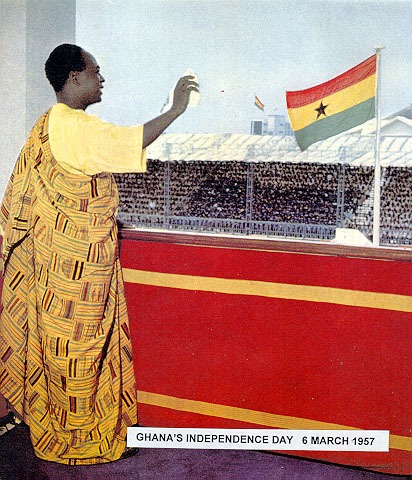 |
|
Nkrumah wanted
Max's father to come to Ghana |
His buddy the
African Marxist, Nkrumah, begged him to come to his
country, Ghana, where he said he was going to become "king and ruler."
Max's father shook his head thankfully "no."
Max told us how difficult it was to have a white
mother and black father in America, but in West Africa, the roles were
changed. A black man with a white wife was given social
elevation. Being "rich" by West African standards, Max
lived the great life. He also walked with two flags, American
and African.
Ian Fleming came to town and talked with
Max's dad. Later, in his book "The Diamond
Smugglers," Fleming notes Max's father. Whenever Max
spoke of his father, he would whip out a tattered copy of Fleming's
book and open it to the page where his father was mentioned as a key
cog in the diamond smuggling machinery. It was Max's passport to
credibility.
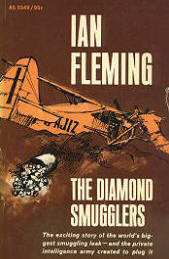
|
|
My friend
Max's father was mention in Ian Fleming's book |
I was
fascinated with Max's life in Africa. Liberia was
under constant turmoil. Governments came and went like Tse
Tse flies, and with each change for the worst, Max and his family
risked falling out of favor with the new regime. It became too
much for Max's mother and she divorced her husband. Max, a
teenager, elected to stay with his father in Africa while Max's mother
and sister went back to live in the U.S.
Max told us stories of how he and his
father escaped government purges by hiding in the jungles of Sierra
Leon, the close neighbor to Liberia. He related how they ate
cassava roots and lived like Tarzan of the Jungle, hiding from patrols
that ruthlessly searched for the "diamond smugglers."
When the regime changed back to one of
favor, they would crawl out of the jungle and resume their lofty
social and political status until the next storm.
I had known about the atrocities and
fragility of the Dark Continent from Max at an early age, but had no
further interest in the continent, as most don't. I
remember reading about the reconstruction of Europe, and how there
were great arguments made that we should have invested the money from
the Marshall Plan in Africa rather than Europe because Africa offered
countless resources. Unfortunately, our European allies won out.
Instead of rebuilding the Dark Continent, we gave the money to France
and Germany. Ooops!
Max and I fought together in Vietnam.
Some of my fond memories include he and I leaping out of helicopters
and engaging the enemy. Max liked to carry a burp gun and once
when we were shot at, he rolled over and smashed his tape recorder
while blasting away.
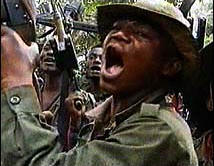 |
|
Civil war is
rampant in Africa |
As we took
over villages to serve as our encampment for the night, he showed us
how to eat the entrails of ducks and dug up plants to eat so we could
enhance our C-Ration diet.
But after the war, I lost Max's
history. It vanished.
Today, when I hear Africa booming in the
headlines, and the Terrorism happening in the Congo and Liberia, I
think of Max.
Civil war rages in his land. In
the Congo, upwards of 3.3 million people have died. Liberia's
streets are washed in blood
I thought of the stories of Nkrumah and how
vicious he was as a leader, perhaps far more tyrannical than
Saddam Hussein or modern tyrants, or at least their equal. He
butchered and slaughtered his people, bragging and boasting as he did.
He was one of many Beasts of Terror to extend the legacy of brutality
and genocide in a land most nations in the world have ignored.
Now, however, the moral dilemma of Vigilance in
Africa faces America.
If our Manifest Destiny in the 21st Century is to
be the Global Sentinel of Vigilance--that is, to depose tyrants and
free people trapped in oppression as we did in Iraq and
Afghanistan--what then is the protocol for Africa?
If it weren't for my buddy Max, I might not have
any connection with Liberia. I might be simply Complacent
as so many Americans and Europeans are regarding Africa. But I
have a personal relationship with a man, a combat buddy, a close
friend, who spent countless hours sharing with me the stories and
myths of his adventures. I envied his time spent in the
jungles with his father, having not had one I could buddy with of my
own.
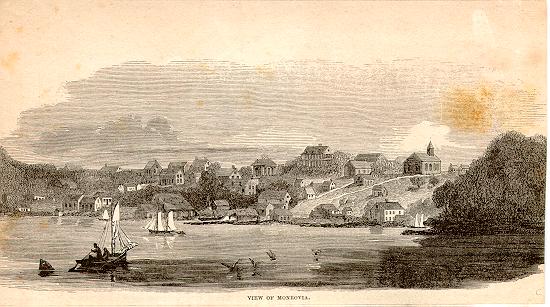
|
|
Monrovia was
named after James Monroe who helped freed slaves return to Africa. |
I knew the
capital city of Liberia was Monrovia, and that it was named after
President Monroe who was instrumental in offering all American
freed slaves a no cost journey back to their homeland if they so
chose.
Monroe, before he was elected the 5th President of the
United States, met
on
December 21, 1816 with a group of exclusively white upper-class males
including Bushrod Washington, Andrew Jackson, Francis Scott Key, Henry
Clay and Daniel Webster at the Davis Hotel in Washington D.C. to form
a constitution for the American Colonization Society.
Their purpose was to raise funds to help transport any and all of the
freed slaves in America back to the land from which they had
been kidnapped.
At the time, some 2 million African
Americans were in the U.S., and some 200 were free. Memberships
in the American Colonization Society, ACS, were sold for $35 to raise
funds. Congress also allocated funding; individual
states as well created their own colonization societies, offering the same
transport for those who wished it back to Africa.
Any slave ship captured at sea
by the U.S. federal government, either domestic or foreign, was
emptied of its slaves and the slaves were given free passage back to Africa.
Opponents of the ACS accused
its organizers of trying to remove free blacks from America, fearful
they could not integrate into "white society." These advocates
fought bitterly against the ACS until following the Civil War they had
crippled it. Many blacks who wished to return home under
the free plan had been stranded by the abolitionists' (some might call
them liberals) enraged commentaries against the plan.
I found it fascinating that
most Americans think of the U.S. as a slave nation, and not as a people who
fought against it, including offering those who had been displaced, a
journey back to their homeland.
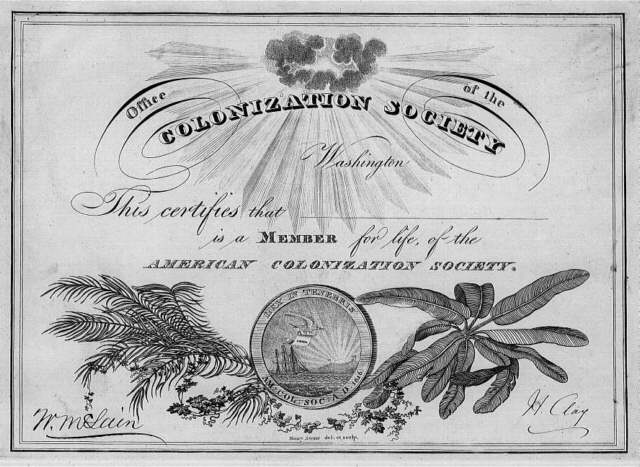 |
|
Copy of American
Colonization Society Certificate. Membership was $35 and
funds went to help transport freed black slaves back to Africa if
they so wished to go. |
I owe a lot of
my understand of the African mentality to Max. Often, he
would talk about the difference between an American black and an
African black. There were distinct differences, he
said. Max felt that American blacks had lost their
identity with Africa, especially when many refused to return to their
country. As I recall, he held a less than high opinion of blacks
who sought to rub salt into the "race wounds," and was the last to
promote the "whites" owed the blacks anything.
But, perhaps America does own Africa
something. Perhaps it owes it the same consideration we
expressed in Afghanistan and Iraq.
We certainly have a closer national
legacy with Liberia than we do any country in the Mid East.
Americans went with the freed slaves and died from yellow fever trying
to build a community. When the colonies grew, America was
asked to annex them, but denied becoming what England was--an empire
builder. Instead, America urged the freed slaves to declare
their independence and create their own country. And they did.
But now the blood is flowing again.
Perhaps America owes a debt to the ACS, not because of any guilt or
shame, but because in a way Liberians are defacto Americans.
Many lived here and the descendents carry with them dual citizenships
as Max does.
As a Sentinel of Vigilance, it makes sense
to me that America owes Liberia "special consideration" in the War on
Terrorism.
But I wonder if America will remember its
allegiance to Liberia, or recall how many were returned to their
country by Acts of Vigilance. Few Americans watching the
horror in Africa may realize the people so honored the United States
as to name their capital after the president who helped give them
passage "home." Or, that many of the Liberians suffering the
claws and jaws of the Beast of Terror are our country's expatriates.
Finally, I wonder: Where is Julius
Maxwell Belcher ?
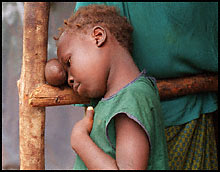 |
|
African girl
had arm cut off during an attack on her village |
Is he part of the
turmoil there, a leader of it? Or, is he a Sentinel of Vigilance
fighting for the rights of the oppressed? Maybe he's just
smuggling diamonds.
I have no idea where he is.
But I do know that Max is half white and half
black, half African and half American, half Christian and half Jew.
He also was born with webbing on his toes, so who really knows who he
is ....or where?
With or without Max, I am convinced that America
owes special consideration to Liberia. Whatever our policy, it
should include helping out our "friends" and our "former countrymen"
remove the Beast of Terror from their land.
We owe that to them.
If you're not sure what our role as Global
Sentinels of Vigilance should be, go back in history and ask President
Monroe.
He'll probably try to get you to buy a
membership in the ACS, or, urge you to sign the Pledge of Vigilance
and think about the future of the Children's Children's Children in
Africa.
June 26--When Whites Are Minorities,
Will The Supreme Court Remember Affirmative Action?
©2001
- 2004, VigilanceVoice.com, All rights reserved -
a ((HYYPE))
design

|
| |
|
|